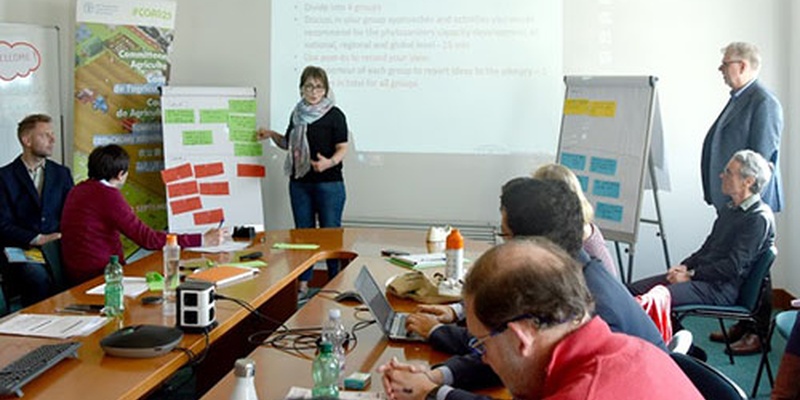A Brainstorming Session on Capacity and Professional Development at the 2018 Annual Meeting of the IPPC Secretariat
Posted on Vie, 01 Feb 2019, 08:06

Mr. Brent Larson (Implementation Facilitation Unit Lead) and Ms Ketevan Lomsadze (Implementation Facilitation Officer) facilitated the Brainstorming Session on Capacity Development. ©FAO/ Sara Giuliani
25 January 2019, Rome - A dynamic brainstorming session, aimed at raising awareness of the concept of Capacity and Professional Development, took place during the 2018 Annual Meeting of the IPPC Secretariat. The concept of Capacity and Professional Development aligns with the 2019 IPPC Annual theme Plant Health and Capacity Development and the 2019 IPPC Secretariat Annual theme Professional Development. The brainstorming session was chaired by Mr. Brent Larson (Implementation Facilitation Unit Lead), and facilitated by Ms Ketevan Lomsadze (Implementation Facilitation Officer) and Ms Denise Melvin (Public Information Specialist).
*The concept of National Phytosanitary Capacity has been defined as the ability of individuals, organizations and systems of a country to perform functions effectively and sustainably in order to protect plants and plant products from pests and to facilitate trade, * said IPPC Officer, Ms Lomsadze, during her introduction to the brainstorming session.
She explained that phytosanitary capacity development was seen as a national process owned by the National Plant Protection Organization (NPPO) and involving national stakeholders. The IPPC Secretariat, Regional Plant Protection Organizations (RPPOs), FAO Regional and Sub-regional offices, international organizations, donors and development agencies, support and facilitate the process.
The IPPC approach is in harmony with the FAO Capacity Development (CD) principles including:
- Country ownership and leadership
- Alignment with national needs and priorities
- Use of national systems and local expertise
- Multiple-level approach, instead of one size fits all
- Mutual accountability
- Integrated long term interventions
- Sustainable development
- Harmonization of action and partnership
After the brief introduction, participants gathered into small groups to discuss Capacity Development approaches and activities, as well as share new ideas and recommendations. Their suggestions included:
- raising awareness of existing IPPC Secretariat tools;
- providing more online training to contracting parties;
- optimizing the IPPC website in order to make it more user-friendly and responsive;
- strengthening cooperation among the IPPC Secretariat, RPPOs and FAO Regional and Sub-regional offices;
- creating training pages for contracting parties which might be called the IPPC University; and
- involving RPPOs in regional CD programmes.
After the brainstorming on Capacity Development, Ms Melvin briefed participants about Professional Development for IPPC Secretariat staff, focusing mainly on language and IT training, writing skills, field missions, and team retreats. Their suggestions included:
- promoting internal knowledge exchange and practicing language skills with native speakers at work;
- providing training in writing skills for all staff and implementing the IPPC style guide;
- organising field trips for IPPC Secretariat staff to nearby ports of entry and sea ports;
- allowing all team members to play a key role in organizing retreats to make them more relevant. Retreats can be for one or two days with much emphasis on team building;
- joining missions only when participation is relevant and there is a demonstrated interest in professional development; and
- assisting contracting parties with organizing meetings ( for example when administrative staff go on missions).





